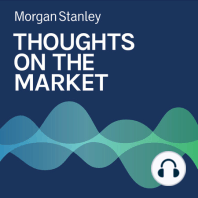4 min listen

Michael Zezas: Looking to the Treasury Market
Michael Zezas: Looking to the Treasury Market
ratings:
Length:
3 minutes
Released:
Jul 12, 2023
Format:
Podcast episode
Description
With a potential government shutdown looming in the fall, investors may want to keep an eye on the U.S. Treasury market to insulate themselves from risk.----- Transcript -----Welcome to Thoughts on the Market. I'm Michael Zezas, Global Head of Fixed Income and Thematic Research for Morgan Stanley. Along with my colleagues bringing you a variety of perspectives, I'll be talking about the potential market impacts of a government shutdown. It's Wednesday, July 12th at 10 a.m. in New York. Press reports warning of a potential government shutdown this fall have understandably led to some questions from clients this week. They're asking what, if any, market impact should they expect if the U.S. fails to appropriate spending for the next fiscal year starting October 1st. The concern, of course, is that markets may react negatively perceiving economic risk if the government without funding ceases certain operations. But some historical perspective is helpful here and leads us to categorize this as a risk worth monitoring but not panicking about. First, while government shutdowns create a very real strain for parts of the economy, like government employees and contractors doing business with the government, our economists have pointed out that in the past, the aggregate impacts to the overall economy have tended to be modest and fleeting. A key reason why is that the norm has been that after shutdowns, the government typically appropriates back pay and resumes prior expected payments to vendors. So spending is simply deferred and made up in the future rather than completely foregone. Not surprisingly, then, market impacts have tended to be inconsistent and fleeting. True, there have been episodes when stocks sold off heading into and during shutdowns and then rally back when shutdowns ended, but it's difficult to desegregate the shutdown as a market driver from other prevailing economic conditions and market valuations. Said more simply, if equity and or credit markets were pricing higher economic optimism, a shutdown could be a temporary headwind for markets. But such a dynamic is far from something that we would base strategic investment guidance on. Despite all this, if you're still looking for a market that might be more insulated from the risk of a shutdown, then given current conditions, we'd look toward the U.S. Treasury market. While it might seem counterintuitive to own government bonds in a government shutdown, remember it was the debt ceiling issue that carried default risk, not a shutdown. In the shutdown, the U.S. Treasury has money and authority to pay bondholders, just not authority to pay certain other government operations. Further, we already think Treasuries are poised to have a strong second half of 2023 as yields could start to decline on softening economic data and an expectation that the Fed would soon be done hiking rates. And while a government shutdown wouldn't necessarily add to that trend, it certainly adds some degree of risk to the economy, reinforcing the case for owning bonds. Thanks for listening. If you enjoy the show, please share your Thoughts on the Market with a friend or colleague or leave us a review on Apple Podcasts. It helps more people find the show.
Released:
Jul 12, 2023
Format:
Podcast episode
Titles in the series (100)
Andrew Sheets: A Second (and Third) Opinion for Equity Markets by Thoughts on the Market